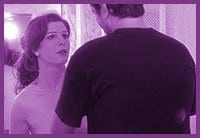Perhaps the most interesting thing about Pierre-Alain Meier’s Swiss film Thelma is that it features a transsexual playing the part of a transsexual, which allows it a certain authenticity that would be lacking if Thelma were played by a woman or a man in drag. A pivotal scene in which the protagonist Vincent (a smouldering Laurent Schilling) discovers his new companion Thelma’s “secret” (her passport defines her as biologically male) leads to a full-frontal nude shot, leaving no room to question Thelma’s gender status – nor that of Pascale Ourbih, the actress who plays Thelma, in her film debut.
This scene might have been entirely gratuitous, but instead is carefully stitched into the fabric of the film. As a result, the relationship of male/female signifiers within the narrative structure is irrevocably altered, allowing the story of the growing love between Vincent and Thelma to be explored on its own terms. Any simple boy-loves-girl trajectory cannot be properly sustained, so Thelma, the character occupying the traditional, so often oversimplified female space of the love story becomes a strong character in her own right, defined not by the script she follows, but by herself.
That element aside, the film is quite straightforward – predictable, even. Despite the interesting questions around gender that it generates, Thelma’s “secret” also functions as a simple and necessary plot device.
When Vincent comes across Thelma in a nasty confrontation with Pierre, her married sometime lover, he whisks her away and spends the evening with her – and winds up driving her all the way to Crete to get her revenge on her lover.
It turns out that Thelma has a friend named Fenia on the Greek isle – Fenia also happens to be the mother of the girl that Thelma fathered when she was still known as Louis. When the parents are reunited (it’s been 10 years since they’ve seen each other), much angst ensues and is processed, leading to a happy ending.
Along the way, Vincent wraps his head around his feelings for Thelma, Thelma learns not to play the victim just because society forces her to the margins and Fenia figures out how to deal with the fact that her child’s father is a woman.
Lushly photographed in that pleasing, brooding French way and full of lovely Mediterranean scenery, Thelma is well worth a look. Finally, though, the answer to the director’s stated question, “How does a man become a woman?” eludes the film.
* Thelma, in French with English subtitles, opens Fri, Mar 14 at the Carlton Cinemas (20 Carlton St); call 598-2309.

 Why you can trust Xtra
Why you can trust Xtra


